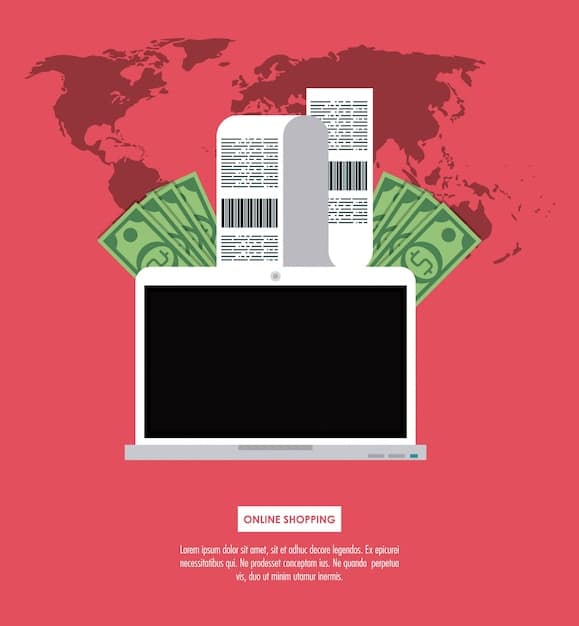Currency Exchange Strategies: Maximize Your Dollar as a US Traveler

Navigating currency exchange can be complex for US travelers; however, understanding exchange rates, choosing the right conversion methods, and avoiding common pitfalls ensures you get the most value from your dollar while traveling internationally.
Traveling internationally is an exciting venture, but managing your money across different currencies can be daunting. With careful planning and the right strategies, US travelers can make the most of their money when navigating the complexities of currency exchange.
Understanding Currency Exchange Rates
Understanding currency exchange rates is crucial for any US traveler venturing abroad. Exchange rates determine how much of a foreign currency you receive for each US dollar, and these rates can fluctuate daily due to various economic factors.
What Affects Exchange Rates?
Several factors influence currency exchange rates. These include economic indicators like inflation, interest rates, and GDP growth, as well as political stability and market speculation. Central banks’ monetary policies also play a significant role.
- Economic Indicators: Strong economic data in a country typically lead to a stronger currency.
- Political Stability: Political unrest or instability can weaken a currency’s value.
- Market Speculation: Speculators trading currencies based on anticipated future movements can cause significant rate fluctuations.
Types of Exchange Rates
There are several types of exchange rates that travelers should be aware of. The spot rate is the current exchange rate for immediate transactions, while forward rates are used for future transactions. Additionally, understanding the difference between interbank rates and retail rates can save you money.

In summary, keeping up with economic trends and knowing the dynamics of market speculation is essential for ensuring you strike the best deals when exchanging currency.
Best Ways to Exchange Currency
When it comes to exchanging currency, US travelers have several options, each with its own set of pros and cons. Understanding these options can help you choose the most cost-effective method for your needs. Here are some strategies to consider.
Banks and Credit Unions
Exchanging currency at your local bank or credit union can be a straightforward and reliable option. Banks often offer competitive exchange rates, especially for their account holders. However, they may charge fees, and their exchange rates might not be the best available.
- Pros: Reliable, secure, convenient for existing customers.
- Cons: Potential fees, less competitive rates compared to specialized services.
- Tips: Check rates in advance and inquire about any additional fees.
Currency Exchange Services
Currency exchange services, such as those found at airports or in tourist areas, offer convenience but typically come with higher fees and less favorable exchange rates. These services are best used for small amounts or in emergencies.
Currency exchange kiosks often have appealing signs, but the hidden commissions and less favorable exchange rates mean you won’t get as much for your dollar. When using these services, be sure to compare prices and read the fine print to avoid hidden costs.
ATMs
Using ATMs for currency exchange can be a convenient option, offering competitive exchange rates. However, it’s important to be aware of potential fees, including those from your bank and the ATM operator. Always opt to be charged in the local currency to avoid dynamic currency conversion fees.
- Pros: Convenient, often offers competitive exchange rates, available 24/7.
- Cons: Potential fees from your bank and ATM operator, security concerns.
- Tips: Use ATMs from reputable banks, check for fees, and opt to be charged in local currency.
To ensure you make the optimal currency switch, researching your possibilities and monitoring transaction fees is definitely advised.
Leveraging Credit and Debit Cards Wisely
Credit and debit cards can be valuable tools when traveling abroad, but it’s essential to use them wisely to avoid unnecessary fees and costs. Understanding foreign transaction fees and choosing the right cards can save you a significant amount of money.
Understanding Foreign Transaction Fees
Foreign transaction fees are charges imposed by your bank or credit card issuer for purchases made in a foreign currency. These fees, typically 1-3% of the transaction amount, can quickly add up, so understanding their impact is crucial.
Be sure to check the terms and conditions of your credit and debit cards to understand any foreign transaction fees. Some cards may waive these fees altogether, making them a more economical choice for international travel.
Choosing the Right Cards
Selecting the right credit or debit cards can significantly reduce your costs when traveling abroad. Look for cards that waive foreign transaction fees and offer travel-related rewards or benefits. Also, consider the acceptance of your card in your destination country.
Some cards offer benefits such as travel insurance, purchase protection, and access to airport lounges. Leveraging these perks can enhance your travel experience while saving money. Additionally, be aware of any fraud prevention measures your bank may have in place.
Tips for Using Cards Abroad
When using credit or debit cards abroad, always opt to be charged in the local currency. Avoid dynamic currency conversion, which allows merchants to convert the transaction amount to your home currency at a less favorable exchange rate. This can result in higher costs for you.

Using your cards wisely and avoiding unnecessary fees hinges on researching your card options and choosing ones without foreign transaction expenses.
Avoiding Common Currency Exchange Mistakes
Navigating currency exchange can be tricky, and it’s easy to make mistakes that cost you money. By being aware of common pitfalls, US travelers can avoid unnecessary expenses and make the most of their travel funds.
Waiting Until the Last Minute
Waiting until the last minute to exchange currency often results in less favorable exchange rates and higher fees. Airport currency exchange services, for example, tend to offer the worst rates due to their convenience and captive audience. Planning ahead can save you money.
When travelers wait until they arrive at their destination, they are often left with fewer options and may feel pressured to accept unfavorable terms. By exchanging currency in advance, you have more time to compare rates and find the best deals.
Failing to Shop Around
Not shopping around for the best exchange rates is a common mistake. Exchange rates can vary significantly between different providers. Comparing rates from banks, credit unions, and online services can help you find the most favorable terms.
- Comparison is Key: Always compare rates from multiple sources.
- Online Tools: Use online comparison tools to find the best deals.
- Check Fees: Be aware of any additional fees or commissions.
Ignoring Fees and Commissions
Ignoring fees and commissions can negate any potential savings from a favorable exchange rate. Many currency exchange services charge hidden fees, so it’s essential to read the fine print and understand all costs involved. Always inquire about any additional charges before proceeding with a transaction.
Avoiding these errors, by planning ahead and monitoring hidden costs, is essential for navigating currency exchange and conserving funds while abroad.
Using Online Currency Exchange Services
Online currency exchange services have become increasingly popular among travelers due to their convenience and often competitive exchange rates. These services allow you to exchange currency from the comfort of your home and can offer significant savings compared to traditional methods.
Benefits of Online Services
Online currency exchange services offer several benefits. They often have lower overhead costs than traditional brick-and-mortar locations, allowing them to offer more competitive exchange rates and lower fees. Additionally, they provide the convenience of exchanging currency at any time, from anywhere with an internet connection.
- Convenience: Exchange currency from home.
- Competitive Rates: Lower overhead leads to better rates.
- Transparency: Clear fee structures and rate displays.
Popular Online Platforms
Several reputable online currency exchange platforms are available to US travelers. These platforms include Wise (formerly TransferWise), Revolut, and OFX. Each platform offers different features, exchange rates, and fee structures, so it’s important to compare them to find the best fit for your needs.
Many online platforms also offer additional features such as multi-currency accounts, travel debit cards, and budgeting tools. These features can enhance your travel experience and help you manage your money more effectively.
Tips for Using Online Services
When using online currency exchange services, it’s important to research the platform’s reputation and security measures. Look for platforms that are licensed and regulated by reputable financial authorities. Also, be aware of any transfer limits, processing times, and potential fees.
To take precautions be sure to monitor exchange rates over time, and sign up for rate alerts to take advantage of favorable exchange rates. Always double-check the exchange rate and any fees before completing a transaction.
Planning and Budgeting for Currency Exchange
Effective planning and budgeting are essential for managing currency exchange when traveling internationally. By creating a budget and strategically managing your currency exchange, you can minimize costs and ensure you have enough funds for your trip.
Creating a Travel Budget
Start by estimating your total expenses for the trip, including accommodation, transportation, meals, activities, and souvenirs. Allocate a specific amount for each category and factor in a contingency fund for unexpected expenses. This budget will serve as a guide for how much currency you need to exchange.
Also, research the cost of living in your destination country. This will help you estimate how much you need to spend on a daily basis. Don’t forget to include any visa fees, travel insurance costs, and other pre-trip expenses in your budget.
When to Exchange Currency
Monitor exchange rates over time and exchange currency when rates are favorable. Consider using rate alerts from online services to notify you of optimal exchange rates. Exchange currency gradually rather than all at once to mitigate the impact of rate fluctuations.
Also, be strategic about when you exchange currency. Avoid exchanging large amounts at airports or tourist areas, where rates tend to be less favorable. Instead, use online services or ATMs to obtain local currency at better rates.
In short, effective planning can help you prepare yourself to meet variable or emerging costs, and therefore, is an essential ingredient for budget management when traveling.
| Key Point | Brief Description |
|---|---|
| 💰 Understand Rates | Learn about exchange rates and what factors influence their fluctuations. |
| 💳 Card Usage | Choose cards that waive foreign transaction fees and always pay in local currency. |
| 🌐 Online Services | Use online platforms for competitive rates and to avoid high fees. |
| 🗓️ Plan Budget | Create a detailed budget and monitor exchange rates to exchange currency at favorable times. |
Frequently Asked Questions
▼
Key factors include economic indicators like inflation, interest rates, GDP growth, political stability, and market speculation. Central bank policies also play a significant role in rate fluctuations.
▼
DCC allows merchants to convert transactions to your home currency at the point of sale. It should be avoided because it typically involves less favorable exchange rates and higher fees than if you pay in the local currency.
▼
Airport currency exchange services are generally not recommended due to their less favorable exchange rates and higher fees. They are best used only in emergencies or for small amounts when no other options are available.
▼
Research credit cards specifically designed for travel and compare their terms and conditions. Many travel rewards cards and premium cards waive foreign transaction fees as a benefit for cardholders.
▼
Online currency exchange services often offer more competitive exchange rates and lower fees. They provide convenience, allowing you to exchange currency from home, and many platforms offer additional features like multi-currency accounts.
Conclusion
By understanding the nuances of currency exchange and implementing effective strategies, US travelers can significantly enhance their international travel experiences. Planning ahead, leveraging the right tools, and staying informed are key steps to maximizing the value of your dollar abroad.





